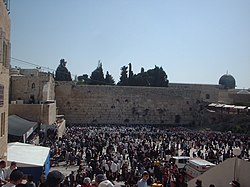
Back Seën van Aäron Afrikaans Aaronitischer Segen ALS Benedicció sacerdotal Catalan Aronitiske velsignelse Danish Aaronitischer Segen German Bendición de Aarón Spanish Herran siunaus Finnish Bénédiction sacerdotale French ברכת כהנים HE Berkat Imamat ID
 Large crowds congregate on Passover at the Western Wall to receive the priestly blessing | |
| Halakhic texts relating to this article | |
|---|---|
| Torah: | Numbers 6:23–27 |
| Shulchan Aruch: | Orach Chayim 128–130 |
The Priestly Blessing or priestly benediction (Hebrew: ברכת כהנים; translit. birkat kohanim), also known in rabbinic literature as raising of the hands (Hebrew nesiat kapayim),[1] rising to the platform (Hebrew aliyah ledukhan),[2] dukhenen (Yiddish from the Hebrew word dukhan – platform – because the blessing is given from a raised rostrum), or duchening,[3] is a Hebrew prayer recited by Kohanim (the Hebrew Priests, descendants of Aaron). The text of the blessing is found in Numbers 6:23–27.
According to the Torah,[4] Aaron blessed the people,[5] and YHWH[6] promises that "They (the Priests) will place my name on the Children of Israel (the Priests will bless the people), and I will bless them". Chazal stressed that although the priests are the ones carrying out the blessing, it is not them or the ceremonial practice of raising their hands that results in the blessing, but rather it is God's desire that the blessing should be symbolised by the Kohanim's hands.
Even after the destruction of the Second Temple, the practice has been continued in Jewish synagogues, and today in most Jewish communities, Kohanim bless the worshippers in the synagogue during shacharit prayer services. [citation needed]
- ^ Encyclopaedia Judaica. Vol. 16. Keter Publishing House, and in New York by the Macmillan Company. 1972. p. 513.
- ^ Nulman, Macy, Encyclopedia of Jewish Prayer (1993, NJ, Jason Aronson) s.v. Birkat Kohanim, page 109; Gold, Avi, Birchas Kohanim (1981, Brooklyn, Mesorah Publications) pages 28–29; Jastrow, Marcus. "A Dictionary of the Targumim, Talmud Babli, Talmud Yerushalmi and Midrashic Literature" (Choreb, 1926) s.v. "dukhan" p. 285
- ^ "Duchen - Jewish English Lexicon". Jewish English Lexicon.
- ^ Numbers 6:23–27. Found in Parshat Naso, the 35th Weekly Torah portion of the annual cycle.
- ^ Liturgical perspectives: prayer and poetry in light of the Dead Sea scrolls ...By Orion Center for the Study of the Dead Sea Scrolls and Associated Literature. International Symposium. p. 243.
- ^ Clyde M. Woods; Justin Rogers (2006). Leviticus and Numbers. College Press. p. 218.